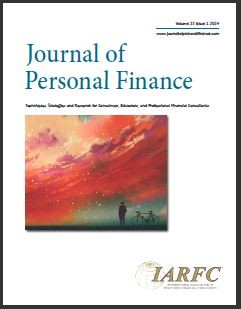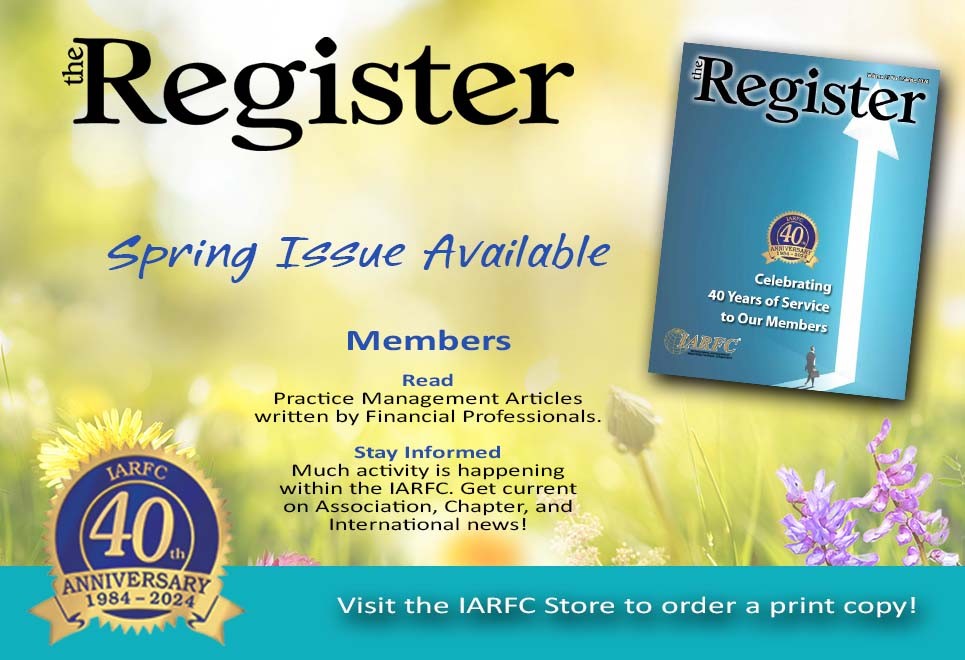
A Growing Global Community
Current Issue

The Journal of Personal Finance is a member benefit of the IARFC. Members can access the full online version by logging into their membership or by joining the IARFC. Hard and Adobe PDF copies are available to Members and Non-Members. Order today.
Current Issue and Archives Join the IARFC IARFC Members Login
"This edition of the Journal of Personal Finance touches on financial health and well-being. We are proud to publish these manuscripts that help develop our collective understanding of how consumers search for financial advice and utilize credit. Our current edition also provides a strong warning about credit card fraud vulnerability from which all Journal readers, their families, and clients will benefit. We open this edition with an exhibit of work from two amazing financial planning students at Utah Valley University. Taken together, our Fall 2023 edition blends academic and practical manuscripts into a broad reaching survey of personal finance."
"The Spring 2024 edition of The Journal of Personal Finance could not be better timed. Rising interest rates, inflation, and higher education costs are imprinted on the minds of consumers, financial professionals, and academics alike. Revolving and nonrevolving consumer debt increased by 7.3% in 2022, 2.6% in 2023, and is up 4.7% from last January.1 Higher interest rates, combined with an uptick in personal loans and credit card accounts assessed interest, paint a stressful picture of what might lie ahead. This edition of The Journal of Personal Finance studies debt and financial literacy through a rigorous lens. We are proud to publish four articles weaving together gender, financial literacy, credit, well-being, fraud, and threats. Different data sets and scales lead to similar factors and conclusions.
Editor Craig Lemoine, Ph.D., MRFC®, CFP®
CE QUIZ
Members of the IARFC can earn CE credits through the Journal of Personal Finance (JPF). Register to take the IARFC JPF Online CE quizzes and receive two for $20. Two hours of IARFC CE will be awarded to anyone who achieves a score of 13 or higher per quiz. Only one submission per member is allowed, quizzes are available as JPF issues are published. To register for a quiz click here.
Volume 23 Issue 1, 2024
Gender, Financial Literacy, and "Do Not Know" Responses
Patti Fisher, Ph.D.
How Does Credit Revolving Impact Wealth and Well-Being?
Christina Lynn, Ph.D., CFP® AFC® CDFA®
Derek R. Lawson, Ph.D., CFP
Blain Pearson
In this study, we explore the moderating effect of revolving credit card debt in early life and its association with wealth and well-being later in life using panel data collected from the Health and Retirement Survey. Using structural modeling, the results indicate that life cycle circumstances, including number of children, marital status, race, and employment, influence wealth levels negatively for credit card revolvers, with minimal effect for non-credit card revolvers. Subsequently, wealth impacts subjective well-being positively later in life for credit card revolvers, with minimal effect on non-credit card revolvers. The findings suggest that revolving credit card debt may increase subjective well-being for older adults. An implication of this study is for families to emphasize the importance of responsibility using credit cards as a transaction vehicle and avoid carrying credit card balances.
An Exploratory Study of the Determinants of Credit Card Fraud Resolution Rates
Hooman Estelami
American consumers’ reliance on credit cards as their preferred mode of payment has grown over the years, affecting much of their personal finances, spending behaviors, and financial risks. At the same time, the sophistication, incidence rate and harms of credit card fraud threaten the financial wellbeing of millions of Americans every year. While the financial losses experienced by the credit card industry due to fraud are reported and monitored regularly, the losses and experiences of individual consumers are largely overlooked in existing academic research. A consumer may be held liable for unauthorized charges if the credit card company views the charges as legitimate. Such cases are often referred by consumers to the Consumer Financial Protection Bureau (CFPB), who intermediates between the consumer and the company. This study examines 5,829 credit card fraud-related complaint records filed with the CFPB in 2022. The effects of the market share of the credit card company and consumer characteristics on complaint resolution rates are empirically examined. The paper concludes with a discussion of the implications for educators, regulators, and financial advisors.
An Examination of Student Loan Dept, Financial Threats, and Financial Worry
Juan E. Gallardo, Ph.D.
Maurice MacDonald, Ph.D.
HaNah Lim, Ph.D, CFP®
Elizabeth Kiss
This study analyzed the relationship between student loans and financial worry using stress and coping theory. Analyses found a direct positive relationship of student loan debt delinquency and non-delinquency with objective and subjective financial threats. The magnitude of the student loan delinquency effect was greater than that of non-delinquency. Both subjective and objective financial threats were positively associated with financial worry, but having a student loan was not a significant predictor of financial worry when threats were accounted for. Instead, financial threats entirely mediate student loan influences on financial worry. Student loan delinquency had a larger indirect effect via objective financial threats on worry than the direct effects of coping resource variables and important demographic factors. Results here provide support for recent interest from policymakers and financial professionals about the non-asset effects of student loans by highlighting the distinction between delinquent and non-delinquent student loans.
ProQuest
The Journal of Personal Finance is available electronically through products and services provided by ProQuest LLC, 789 East Eisenhower Parkway, PO Box 1346, Ann Arbor, Michigan 48106-1346. More information can be found at www.proquest.com or call (800) 521-0600.
 © 1984-2024 IARFC. All Rights Reserved · 146 North Breiel Blvd. Middletown, Ohio 45042 ·
© 1984-2024 IARFC. All Rights Reserved · 146 North Breiel Blvd. Middletown, Ohio 45042 · 